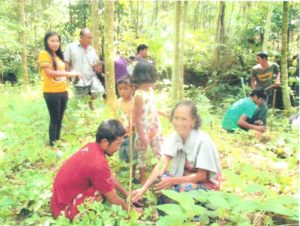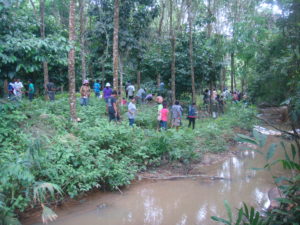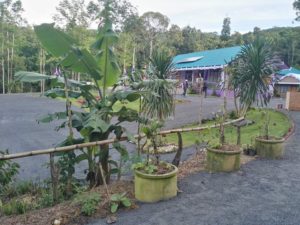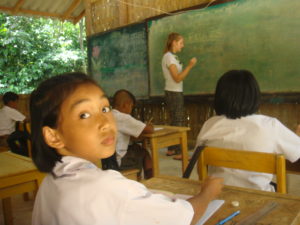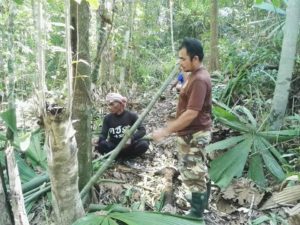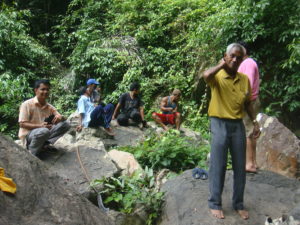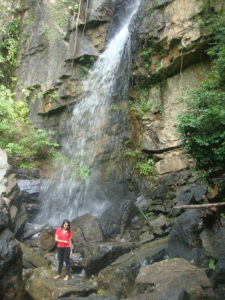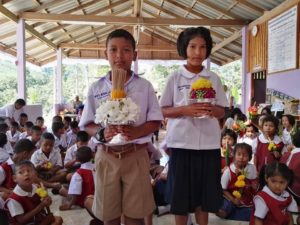Forest preservation, active community, join the local school, activities with kids, foreign language and culture exchange, remote area…
Cha Uat district, Nakorn Sri Tammarat province, South Thailand
DaLaa MTV project – code: 1704
Periods available: all year round (except school holidays: October, March and April)
Expected number of volunteers: 2 to 4
SHORT DESCRIPTION
Lang Ai Mee community, from the remote and mountainous area of South Thailand, is seeking volunteers to support their action of preserving harmonious relationships within the community, with the environment and the world. Their position in the watershed of Cha Uat river gives them the responsibility to preserve the forest so clean water can flow continuously through the valley. Their fights against the government who declared the place as a national park and tried to evacuate them in the past make their group strong and determined. Nowadays, they show actively that they are able to take care of their environment. The new learning center started by the police border patrol and the sister of the Thai new king is now taking care of the education of the local children and volunteers would be greatly appreciated to support with foreign language and activities exchange.
HISTORY and REASONS OF THE PROJECT
Lang Ai Mee is a mountainous village of Nakorn Sri Tammarat province, Cha Uat district, part of Bantad Range Mountain. It is the watershed area giving birth to Cha Uat river flowing through the town of the same name and until the Chinese sea in Pak Panang district.
The first people came to live in this area in 1963. It’s a good area to plant rubber and fruit plantations. One of them was named Mee and gave his name to the village. In 1972, The government declared this area a national park and since then tries to forbid the villagers to live there and to use the natural resources, arguing that villagers are destroying nature. (The same government who allowed before some companies concessions to cut all the forest-rich trees species to sell abroad.)
Since that time, the villagers, about 60 families at that time, gather to fight against this decision and to prove they can live in harmony with the forest, nature and can take care of it. Many volunteers’ activities have been going on in the village and now the community is very strong and responsible.
In 2002, they create a group “Ton Rak Paa Ton Nam” which could be translated by “Love forest and watershed” to gather now 157 families and 463 people. They made agreements together to preserve the forest, animals, water, trees, and organize activities together.
In 2014, the police border patrol helped to start a local school so children can have education all the year along. In 2015 and 2016, DaLaa volunteers situated in Roywan Phan Pba project close to the place joined often activities with the school and the villagers. The princess and donators made it possible to create a new and beautiful learning center for the local children in the village (called the school).
After Roywan project was stopped in 2016, an active member from Lang Ai Mee, P Com and an active teacher close to the villagers, Crue Prakan, contacted us to request more volunteers to join their activities.
AIMS of the PROJECT
– Exchange and learn language and culture with the local community.
– Support the local group: Love forest and watershed.
– Support the learning center on the foreign language aspect.
– Help to give responsibility and harmony to local people in preserving their culture and way of life.
WORK AND ACTIVITIES
– Learning center (=school): exchange language, activities with kids. The school will adapt to each volunteers skills.
– Join and exchange activities about the local culture, occupation (fruit and rubber farming, using local material to make crafts like brooms…)
– Take care of the forest and watershed: plant trees close to the river, look around for seeds species, tree nursery, and small dams to keep humidity…
– Join with the women group to make processed food from the forest: chilli sauce, kind of palm fruit to boiling…
FOOD and ACCOMMODATION
Volunteers have their own house with a small kitchen. There will be a simple mat, pillow and mosquito net. You will need to bring a sleeping bag – more bedding materials could be an option in case you are not used to sleeping on the hard floor. The volunteer will be taken care of by the neighbour family who will take care of them for daily matters including buying food, security and transport. During activities at school (most school days), the lunch will be offered there. There are 4 or 5 families who are willing to welcome the volunteers at their house. Local people eat rice (or noodles) 3 times a day with side dishes like curries, omelettes, local leaves and vegetables. They agree to adapt to volunteers needs and tastes using the ingredients available there.
OTHER PRACTICAL INFORMATION
Laundry: expect to hand-wash your clothes
Water supply and electricity: available
Internet/phone access: At the school, and mostly only at the school, there is a connection for DTAC and True move phone companies’ network. You can use the internet with a Thai Sim card and your mobile phone.
The closest big village, Tung Chumpon is at 7km with a health center, ATM, market twice a week and temple.
Mai Seap is a bigger village at 16 km. It is the place to take the bus to and from the project.
Pa Payom, is a town at 18km, where there is a hospital.
Hat Yai, the main city of South Thailand (close to DaLaa office) is 2 hours by bus/minibus from Mai Seap.
It usually rains stronger from November to January and the fruit season is in August to October.
Clothes worn in the village: You will be living in an area with elderly people and children around so it is appropriate that you dress modestly, for example, no short skirts or shorts too far above the knees. Also, women should wear tops that cover your shoulders. Bikini is not appropriate to swim. Please wear shorts and a top instead. You will learn more about Thai culture in the introduction day so please don’t worry too much. You will quickly learn when it best to dress more informally and when it is important to cover-up
Language: only very few people in the village can speak good English (Crue Prakan, the teacher is one of them). We strongly advise the volunteers to learn at least basic Thai language before or during the start of your project. Non-verbal communication will be as well essential.
Few things not to forget: Flashlight, mosquito repellent (nature-friendly if possible), light long sleeves clothes, closed shoes and flip flops, rain jacket, hat, something to show your culture, food, pictures…, games, music, your motivation and beautiful smiles.
REQUIREMENTS
The volunteers should be ready to stay in a remote area (in the middle of the forest), to adapt to the local conditions with only basic facilities and with very few people able to speak in English. Volunteers should be able to handle a spontaneous working environment and constant changes in the plans. The mentality and way of thinking are very different from the western world. There will have often activities with the children. To have responsibility for yourself, the kids and full involvement in community matters is a must.
**For ones who plan to travel in Thailand/Asia besides this voluntary work, having it done before or after the project would be advisable. We hope that volunteers will fully spend their stay in the project without asking for a long holiday break amid the project period. This would cause uncertainty in running activities.

